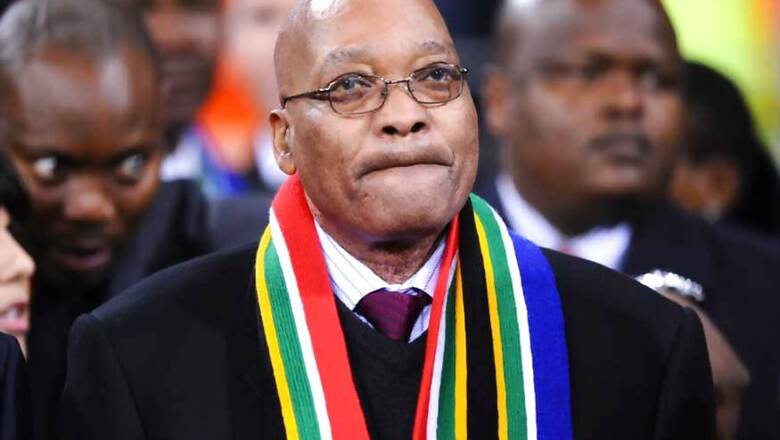
views
Durban: South Africa's former president Jacob Zuma is due to appear in court in Durban on Friday to face corruption charges linked to a multi-billion dollar 1990s arms deal that dogged his time in government.
Zuma's supporters are expected to rally at the city's High Court to protest his prosecution which was announced just four weeks after he resigned under mounting pressure from the ruling African National Congress (ANC) party.
It is expected that Zuma will be formally charged with 16 counts of corruption, money laundering and fraud during the hearing which is likely to be brief and procedural.
On Thursday night more than 100 ardent Zuma backers rallied in Albert park in a gritty suburb of Durban to protest his innocence and demand a halt to the prosecution.
"There is an unfairness in the judiciary," warned bishop Timothy Ngcobo, one of the organisers of Thursday's gathering.
"We believe God did stand with Jesus Christ when he was detained. We say also he can stand with Jacob Zuma," added pastor Nqoba Zindela, another organiser.
Nearby, a crowd of 50 young women, some wearing Zuma shirts, gathered below an underpass in a corner of the park to chant in support of their embattled former president.
The protesters sang liberation-era songs including "Umshini Wam", meaning "Bring me my machine gun", which Zuma often sang at ANC rallies and gatherings.
'Traitors'
Police are expected to mount a massive security operation with the local Daily News newspaper reporting that the judge will receive a "special security escort" to court.
Zuma is accused of taking bribes from French arms maker Thales over a contract worth several billion dollars during his time as a provincial economy minister and then deputy ANC president.
Police expect that more than 2,000 protesters could descend on the court house to voice support for Zuma with the main opposition Democratic Alliance planning a counter demonstration.
Zane Mlaba, a local ANC activist, described party leaders who called on members not to rally around Zuma "traitors".
"(Police minister) Bheki Cele said not to come — he has bitten the hand that fed him," he told AFP.
"We are not doing this because of tribalism," he added of the almost entirely Zulu crowd that had gathered ahead of Zuma's court appearance.
Zuma is a Zulu and has his ancestral home in eastern KwaZulu-Natal, the province which makes up the bedrock of his support base.
Black First Land First (BLF), a radical pro-Zuma group that has supported him through numerous scandals, said it expected 200 bus-loads of supporters to travel to the court ahead of his arrival.
"In Zuma's case it seems that it is guilty until proven innocent," said BLF regional spokesman Thobani Zikalala who warned that a campaign by opposition parties against Zuma would preclude a fair trial.
Fair trial
"No black person will get a free (and fair) trial. The law is based on a logic that is against us."
Thales, which supplied naval vessels as part of the deal, will also be charged with corruption and company representatives are expected to appear in court alongside Zuma.
Zuma is accused of illicitly pocketing a total of 4,072,499.85 rand — 280,000 euros at today's exchange rates — from 783 payments handled by Schabir Shaik, a businessman who acted as his financial adviser.
Zuma, who came to power as president shortly after the charges were first dropped in 2009, has always denied any wrongdoing.
Shaik was sentenced to 15 years in prison in 2005 based on the same accusations, but a much-criticised 2016 inquiry absolved Zuma of any blame.
Zuma claimed that the inquiry proved that "not a single iota of evidence (shows) that any of the money received by any of the consultants was paid to any officials".
Last month, prosecutions chief Shaun Abrahams — dubbed "Shaun the Sheep" for his loyalty to Zuma during his presidency — ordered that Zuma be charged with fraud, corruption and money laundering.
The ANC forced Zuma from office in February largely due to his mounting legal challenges and scandals, and it has distanced itself from its former leader.
Zuma's successor Cyril Ramaphosa has vowed to crack down on government corruption, which he has admitted is a serious problem.
Campaign groups are hoping that the case could set a benchmark for allegedly corrupt leaders to face prosecutions, the likes of which are a rarity on the African continent.
















Comments
0 comment